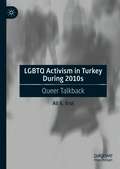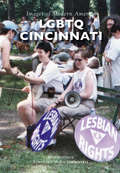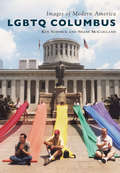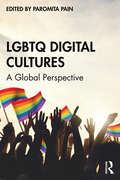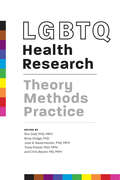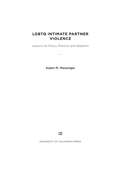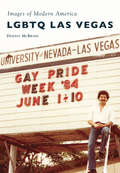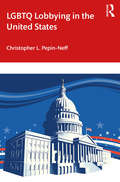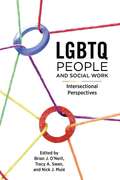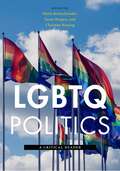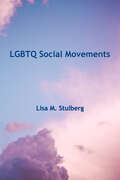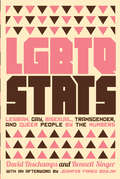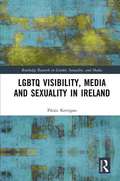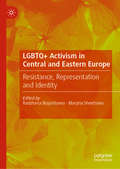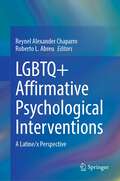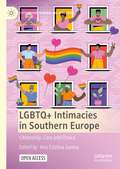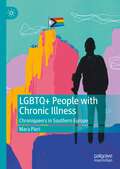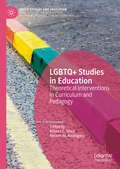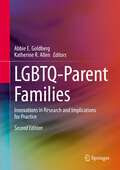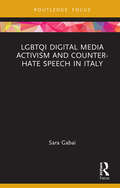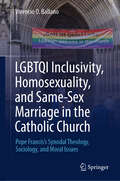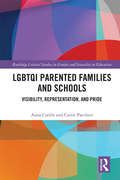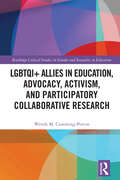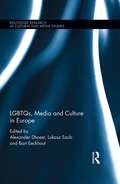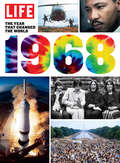- Table View
- List View
LGBTQ Activism in Turkey During 2010s: Queer Talkback
by Ali E. ErolDuring the 2010s in Turkey, LGBTQ activists, groups, and individuals persisted against social, political, and legal adversity. Erasure during the Gezi Park Protests in 2013, a Pride parade ban in Istanbul in 2016, and indefinite ban on all LGBTQ events in Ankara in 2017 directly aimed at ending the activities, visibility, and existence of LGBTQ organization in the two biggest cities in Turkey. This work examines the ways in which LGBTQ activists engaged in talkback against these restrictions that impacted the lives of LGBTQ individuals and how said individuals endured such adversity. Focusing on the elements of discourse used by LGBTQ activists, this work argues oppositional discourses need to address as well as remedy the various elements of normative discourses—constructions of space, time, and affect—in order to be deemed a talkback, instead of merely perpetuating the normativities of oppressive discourses.
LGBTQ Cincinnati (Images of Modern America)
by Ken SchneckCincinnati's LGBTQ history is a study in riveting contradictions. Seen as one of the more conservative cities in Ohio, Cincinnati is also the home of the first Pride march in the entire state. A strong move to censor the LGBTQ-related art of Robert Mapplethorpe at the Cincinnati Contemporary Arts Center resulted in a nationally publicized trial where freedom of expression emerged victorious in the face of those who zealously sought to suppress the LGBTQ community's voice. The passage of Issue 3 in 1993 epitomized the tenet that minority rights should never be up for majority vote, while the repeal of Article XII eleven years later displayed the sheer power of mobilization. Through protests, celebrations, and demonstrations of unadulterated pride, Cincinnati has proven itself over and over again as a community of individuals trying to make the Queen City live up to its royal--and decidedly LGBTQ--name.
LGBTQ Columbus (Images of Modern America)
by Ken Schneck Shane McClellandThroughout the decades, Columbus has been a central gathering place for Ohioan LGBTQ individuals, creating a timeline of milestones--both big and small--all showcased within the Buckeye State capital. From the hidden joy of the underground Berwick Ball of the 1960s to the unrestrained opulence of the Red Party in the 1970s to the sense of community displayed at the first Columbus Pride in the 1980s, the city has played host to celebrations, struggles, and history. Through the bar raids at the turn of the millennium to the Black Pride 4 in 2017, the LGBTQ Columbus community has steadfastly marched forward, using their voices to proclaim their undeniable presence, their demands for equality, and their passion for this city they call home.
LGBTQ Digital Cultures: A Global Perspective
by Pain ParomitaEmphasizing an intersectional and transnational approach, this collection examines how social media and digital technologies have impacted the sphere of LGBTQ activism, advocacy, education, empowerment, identity, protest, and self-expression. This edited collection adopts a critical and cultural studies perspective to examine queer cyberculture and presence. Through the lens of representation and identity politics, it explores topics such as race, disability, and colonialism, alongside sexuality and gender. The collection examines how digital technologies have made queer cultural production more expansive and how such technological affordances and platforms have enabled queer cultural practices to be more transformational. Bringing together contributors and case studies from different countries, the contributions grapple with the tensions that arise when visibility, hiddenness, renditions of the self, and collective contractions of identity must be negotiated in a variety of global contexts and explores this influence on contemporary political identities. This book provides an essential introduction to LGBTQ digital cultures for students, researchers, and scholars of media, communication, and cultural studies. It will also be of interest to activists wanting to learn more about the transformative potential of digital media and technology in LGBTQ advocacy and empowerment around the globe.
LGBTQ Health Research: Theory, Methods, Practice
by Ron Stall PHD, MPH, et al.The first book focused entirely on the growing field of LGBTQ health research, this volume provides the necessary public health tools to teach about and study LGBTQ populations effectively.Over the last 30 years, the health needs of lesbian, gay, bisexual, transgender, and queer Americans have become increasingly recognized, in particular for the ways in which they are distinct from those typically assessed and addressed in society. Universities and researchers are paying greater attention to LGBTQ public health issues and how they might adapt existing methods to research marginalized communities, but—until now—there has been no authoritative resource to guide their education or practice. Developed for graduate students in public health and health sciences—but perfect for anyone interested in this topic—this book will fill that gap and provide the necessary public health tools to teach about and study LGBTQ populations effectively. Divided into three sections and edited by top scholars, LGBTQ Health Research explains research methods important to descriptive epidemiology that are needed to document health disparities among LGBTQ populations. The book also examines research methods that help explain the driving forces of these disparities. Focusing on real-world experience in developing and testing interventions to mitigate health disparities in LGBTQ populations, it also breaks down issues that challenge the direct application of standard research methods with these communities, including those related to sampling, measurement, choice of theoretical variables to explain the distribution of health and illness, cultural competence in intervention design, and community participation.Promoting the creation and diffusion of effective interventions, the book takes a holistic approach to address longstanding research gaps regarding important marginalized communities. It also documents profound health disparities in many LBGTQ populations across a wide range of health conditions and explains why future development of the field must be based on inclusive science and rigorous research methods. LGBTQ Health Research is an essential textbook for any courses that deal with the intersection of marginalization, health, sexuality, and gender.Contributors: José A. Bauermeister, Chris Beyrer, Kerith Conron, Brian Dodge, Rita Dwan, Stephen L. Forssell, Peter Gamache, Gary W. Harper, Mark L. Hatzenbuehler, Colleen Hoff, Carl Latkin, Ilan H. Meyer, Robin Lin Miller, Angulique Y. Outlaw, Christopher Owens, Tonia Poteat, Erin Riley, Joshua Rosenberger, Ayden I. Scheim, Shauna Stahlman, Randall Sell, Ron Stall, Rob Stephenson, Rachel Strecher, Ryan C. Tingler, Karin E. Tobin, Ronald O. Valdiserri, and Richard J. Wolitski
LGBTQ Intimate Partner Violence: Lessons for Policy, Practice, and Research
by Adam M. MessingerNationally representative studies confirm that LGBTQ individuals are at an elevated risk of experiencing intimate partner violence (IPV). While many similarities exist between LGBTQ and heterosexual IPV, research has illuminated a variety of unique aspects of LGBTQ IPV regarding the predictors of perpetration, the specific forms of abuse experienced, barriers to help-seeking for victims, and policy and intervention needs. This is the first book that systematically reviews the literature regarding LGBTQ IPV, draws key lessons for current practice and policy, and recommends research areas and enhanced methodologies.
LGBTQ Las Vegas
by Dennis McbrideLas Vegas is known around the world as a flashy, libertarian oasis where an individual�s pursuit of happiness and profit is paramount. This was not true for the city�s queer community. Being gay in Las Vegas until the 1990s was a felony with a hefty fine and long prison sentence. The Las Vegas LGBTQ community did not organize to fight for its rights until the late 1970s and by the early 1980s had made significant headway, before AIDS stopped their momentum. While the plague was devastating, it taught compassion, self-reliance, and political savvy. In 1993, the community persuaded the Nevada State Legislature to repeal the state�s sodomy law, and throughout the 1990s and 2000s�even with some significant setbacks�Las Vegas rapidly caught up with more enlightened places in the United States. By 2017, Las Vegas was a city among the most welcoming of the nation�s queer community.
LGBTQ Lobbying in the United States
by Christopher L. Pepin-NeffLGBTQ Lobbying in the United States argues that the issues and tactics prioritized by the mainstream gay lobbying community fail to serve LGBTQ interests and are complicit in perpetuating heteronormative power dynamics and institutions that render queer and trans people vulnerable to structural oppression. The book posits that there are different LGBTQ lobbying communities—a dominant gay mainstream lobbying category, whose work advances heteronormative ideals, and a second category of LGBTQ lobbying that is intersectional and challenges hegemonic heterosexual institutions. Analysis in the book builds on existing public policy literature and is aided by the author's practitioner experience in lobbying for LGBTQ issues in Washington, D.C. over the past 20 years. This book is suitable as a textbook for students and researchers in LGBTQ studies, U.S. politics, and gender studies. The book will also appeal to activists and professionals in political lobbying.
LGBTQ People and Social Work: Intersectional Perspectives
by Brian J. O'Neill Tracy A. Swan Nick J. MuleThis unique edited collection addresses issues impacting the well-being of LGBTQ individuals with diverse identities to help students, practitioners, educators, and policymakers work with sensitivity and strength in the LGBTQ communities. Edited by three expert LGBTQ scholars, this engaging book offers a multiplicity of perspectives through the works of practitioners, students, and activists. <P><P>By focusing on intersectionality and its application to social work practice, organizational change, and the pursuit of social justice, this text gives voice to previously silenced members of the LGBTQ community. The contributors of this important collection deepen insight into the diversity of identities within LGBTQ communities and provide many thoughtful recommendations to inform future social work pedagogy, agency policy, and forms of practice in diverse contexts and fields of service. This book is a valuable resource for students in Social Work, Community Medicine, Counselling Psychology, Nursing, Equity Studies, and Gender Studies, as well as anyone engaged in social service work.
LGBTQ Politics: A Critical Reader (LGBTQ Politics #3)
by Marla Brettschneider Susan Burgess Christine KeatingA definitive collection of original essays on queer politics in the U.S. and around the world. From Harvey Milk to Barney Frank to ACT UP to Proposition 8, in the last few decades, no political change has been more significant than the civil rights advancements of LGBTQ citizens. LGBTQ Politics is the first authoritative reader to approach the complexity of queer politics from a political science perspective, bringing together original contributions from leading scholars in the field on key issues of LBGTQ politics. These original essays cover a wide range of essential topics, including marriage equality, transgender discrimination, gay and lesbian political candidates, LGBTQ human rights advocacy, HIV prevention, and LGBTQ movements of the Global South. The volume also includes a number of critical essays that reflect upon the state of political science as a discipline that has struggled to address queer politics. Contributors draw from a variety of subfields in political science, including comparative politics, political theory, American politics, public law, and international relations. Essays that focus on mainstream institutional politics appear alongside contributions grounded in grassroots movements and critical theory. While some essays express concerns that the democratic basis of the LGBTQ movement has been undermined, others celebrate the movement&’s successes and offer visions for the future, A comprehensive, thought-provoking, and authoritative collection, LGBTQ Politics: A Critical Reader is required reading for anyone looking to learn about the politics of sexuality.
LGBTQ Social Movements (Social Movements Ser.)
by Lisa M. StulbergIn recent years, there has been substantial progress on lesbian, gay, bisexual, transgender, and queer (LGBTQ) civil rights in the United States. We are now, though, in a time of incredible political uncertainty for queer people. LGBTQ Social Movements provides an accessible introduction to mainstream LGBTQ movements in the US, illustrating the many forms that LGBTQ activism has taken since the mid-twentieth century. Covering a range of topics, including the Stonewall uprising and gay liberation, AIDS politics, queer activism, marriage equality fights, youth action, and bisexual and transgender justice, Lisa M. Stulberg explores how marginalized people and communities have used a wide range of political and cultural tools to demand and create change. The five key themes that guide the book are assimilationism and liberationism as complex strategies for equality, the limits and possibilities of legal change, the role of art and popular culture in social change, the interconnectedness of social movements, and the role of privilege in movement organizing.
LGBTQ Stats: Lesbian, Gay, Bisexual, Transgender, and Queer People by the Numbers
by Bennett Singer David DeschampsTwenty years ago it was impossible to imagine the president of the United States embracing same-sex marriage or Bruce Jenner transitioning to Caitlyn Jenner, an open transgender woman. <P><P>LGBTQ Stats chronicles the ongoing LGBTQ revolution, providing the critical statistics, and draws upon and synthesizes newly collected data. Deschamps and Singer—whose previous books and films on LGBTQ topics have won numerous awards and found audiences around the globe—provide chapters on family and marriage, workplace discrimination, education, youth, criminal justice, and immigration, as well as evolving policies and laws affecting LGBTQ communities. A chapter on LGBTQ life around the globe contrasts the dramatic progress for LGBTQ people in the United States with violent backlash in countries such as Russia, Iran, and Nigeria, which have discriminatory laws that make same-sex activity punishable by prison or death. <P><P>A lively, accessible, and eye-opening snapshot, LGBTQ Stats offers an invaluable resource for activists, journalists, lawmakers, and general readers who want the facts and figures on LGBTQ lives in the twenty-first century.
LGBTQ Visibility, Media and Sexuality in Ireland (Routledge Research in Gender, Sexuality, and Media)
by Páraic KerriganThis book traces the turbulent history of queer visibility in the Irish media to explore the processes by which a regionally based media system shaped queer identities within a highly conservative and religious population. The book details the emergence of an LGBTQ rights movement in Ireland and charts how this burgeoning movement utilised the media for the liberatory potential of advancing LGBTQ rights. However, mainstream media institutions also exploited queer identities for economic purposes, which, coupled with the eruption of the AIDS pandemic in the 1980s, disrupted the mainstreaming goals of queer visibility. Drawing on industrial, societal and production culture determinants, the author identifies the shifting contours of queer visibility in the Irish media, uncovering the longstanding relationship between LGBTQ organising and the Irish media. This book is suitable for students and scholars in gender studies, media studies, cultural studies and LGBTQ studies.
LGBTQ+ Activism in Central and Eastern Europe: Resistance, Representation and Identity
by Maryna Shevtsova Radzhana BuyantuevaThis edited collection offers in-depth perspectives into the emergence and development of LGBTQ+ movements in Central and Eastern Europe, including analysis of Estonia, Hungary, Poland, Romania, Russia and Ukraine. The book examines various issues faced by local LGBTQ+ activists, as well as the tactics and strategies which they develop and adopt. The contributors discuss the applicability of Western ideas and concepts to the post-socialist context, considering their ability to fully tackle local nuances and complexities with regards to sexuality and, thus, the dynamics of LGBTQ+ activism. The volume examines differences in the domestic policies of these countries and the consequent effects on LGBTQ+ activism in the region. It also offers important insights into the impact of Western actors in promoting liberal democratic values in the region, and ensuing political and social backlashes.LGBTQ+ Activism in Central and Eastern Europe will be of interest to students and scholars across a range of disciplines, including Gender and Sexuality Studies, Sociology, Anthropology and Political Science.
LGBTQ+ Affirmative Psychological Interventions: A Latine/x Perspective
by Reynel Alexander Chaparro Roberto L. AbreuThis book presents descriptions of interventions, results of empirical research, and theoretical contributions developed by Latine/x psychologists based on affirmative approaches aimed at promoting acceptance and understanding of LGBTIQ+ people. Contributions in this volume bring together the work of Latine/x scholars, practitioners, and activists across five Latin American countries or territories (Argentina, Chile, Colombia, Mexico, and Puerto Rico) and in the United States, in an effort to provide multicultural perspectives to LGBTIQ+ affirmative psychological interventions that highlight local, regional and national particularities. Chapters in this volume go beyond contributions made by applied psychology fields (e.g., clinical and counselling psychology), where affirmative orientations are predominantly located, and include contributions from other fields of psychological research such as social and community psychology. The book is divided in two parts. Chapters in the first part focus on the experiences of trans and gender non-conforming people, with emphasis on contemporary systemic issues that affect gender identity among Latine/x communities and those who do not conform to hegemonic narratives about gender. Chapters in the second part focus on sexual identity among Latine/x LGBTIQ+ people and their families and communities. Contributions in this part present discussions about sexual orientation (grouped in LG/LGB identities), sex and gender dissidence, and the inclusion of intersex. LGBTQ+ Affirmative Psychological Interventions: A Latine/x Perspective will be of interest to both researchers and practitioners in different fields of psychology – such as clinical, counselling, social, and community psychology – interested in a multicultural perspective to understand and develop LGBTQ+ affirmative actions to fight against the repathologization of individuals, groups, families and diverse communities.
LGBTQ+ Intimacies in Southern Europe: Citizenship, Care and Choice (Citizenship, Gender and Diversity)
by Ana Cristina SantosThis Open Access book argues that Southern European countries offer valuable, though historically overlooked, knowledge regarding intimate citizenship. Guided by the fundamental sociological question of how change takes place and, concomitantly, how law and social policy adjust to and/or shape the practices and expectations of individuals in the sphere of intimacy, this edited volume explores partnering, parenting and friendship issues from the perspective of lesbian, gay, bisexual, trans and queer people in Italy, Portugal and Spain. Chapters offer a cross-national understanding of the relationship between everyday practices of intimacy amongst LGBTQ people and national legal, political and policy contexts in terms of the recognition of otherwise ‘intimate strangers’. The book contributes to further theoretical and policy debates about citizenship, care and choice, as well as, more broadly, sexuality, welfare, health and justice. This book will be of interest to scholars across Gender and Feminist Studies as well as Citizenship Studies, Law, Policy, and Politics.
LGBTQ+ People with Chronic Illness: Chroniqueers in Southern Europe
by Mara PieriDrawing on theory and empirical research, this book provides an analysis of the intersections between LGBTQ+ identification and chronic illness. Chapters focus on the theoretical meaning of chronic illness as a queer notion, as well as the lived experiences of chronically ill LGBTQ+ people. The author analyzes chronic illness as an experience that interrogates the normative notions of time, (in)visibility, and disability. Interweaving notions of heteronormativity and able-bodiedness as interwoven and mutually dependent, this book argues that the experience of chronic illness through the LGBTQ+ embodiment presents the potential to imagine bodies differently.This book will be useful for scholars and students in Disability Studies, Queer Studies, and Gender Studies.
LGBTQ+ Studies in Education: Theoretical Interventions in Curriculum and Pedagogy (Queer Studies and Education)
by Nelson M. Rodriguez Robert C. MizziThis edited volume utilizes critical perspectives other than/or in addition to LGBTQ+ studies to facilitate knowledge-building on pedagogical and curricular approaches to LGBTQ+ studies within the context and concerns of promoting LGBTQ+ inclusivity across various educational spaces. Chapters include: intersectional analysis, pedagogies of discomfort, critical theory/critical peace education, critical literacy studies, social class theory, public pedagogy studies, critical theory/critical pedagogy, Indigenous/decolonizing studies, critical posthumanist theory, personal narratives as pedagogy, and critical heterosexuality studies, among other perspectives. Through this collection, the editors and their authors demonstrate that other perspectives (in addition to LGBTQ+ studies) can be equally helpful to teaching practices and curricula that advance LGBTQ+ inclusivity and knowledge production.
LGBTQ-Parent Families: Innovations in Research and Implications for Practice
by Abbie E. Goldberg Katherine R. AllenThis textbook offers a comprehensive overview of research on LGBTQ-parent families. The new edition of the textbook provides updated information and expands on the range and depth of current research. The volume features contributions from scholars in psychology, sociology, human development, family studies, gender studies, sexuality studies, legal studies, social work, and anthropology. In addition, the textbook offers an international perspective, with coverage spanning many diverse nations and cultures. Chapters highlight key research, exploring sexual orientation in relation to other key social identities, such as gender, race, and nationality. Chapters also discuss new, emerging areas of research, including asexuality and immigration. The textbook concludes with a section on the growing sophistication of research methodology in the study of LGBTQ-parent families. The second edition includes new chapters discussing: LGBTQ-parent families and health. LGBTQ foster parents. LGBTQ adults and sibling relationships. LGBTQ-parent families and poverty. LGBTQ-parent families and separation/divorce. LGBTQ-parent families and religion. LGBTQ-parent families and grief/loss. Methods, recruitment, and sampling in research with LGBTQ families. Teaching/pedagogy on LGBTQ-parent families. LGBTQ-Parent Families, 2nd Edition, is a valuable updated resource for graduate students as well as veteran and beginning clinicians across disciplines, including family studies, family therapy, gender studies, public health, social policy, social work and child and adolescent psychology as well as related disciplines across mental health and educational services.
LGBTQI Digital Media Activism and Counter-Hate Speech in Italy (Focus on Global Gender and Sexuality)
by Sara GabaiLGBTQI Digital Media Activism and Counter-Hate Speech in Italy analyzes the organizational communication practices of Italian LGBTQI activists. The book investigates digital media activism practices, and how, through artifacts of political engagement, activists are championing social change through non-violent communications. The author also interrogates whether legal means are enough to combat hate and promote a culture of human rights. This book is an essential read for students and scholars interested in LGBTQ rights and activism.
LGBTQI Inclusivity, Homosexuality, and Same-Sex Marriage in the Catholic Church: Pope Francis’s Synodal Theology, Sociology, and Moral Issues
by Vivencio O BallanoThis book employs an experimental approach to critically re-examine the Catholic Church’s traditional teachings on homosexuality, heterosexual marriage, and Lesbian, Gay, Bisexual, Transgender, Queer, and Intersexual (LGBTQI) inclusivity in light of Pope Francis’s inductive synodal theology and modern sociology. With the growing complexity of today’s culture and the advancement of social science research, it argues that the empirical foundations of the traditional Church’s doctrines on topical moral issues need to be scientifically re-assessed, so as to update them in view of Francis’s synodality and sociological research on gender, sexuality, and same-sex union. Discussion pertaining to whether homosexuality is naturally disordered and whether heterosexuality is the only criterion for Christian marriage remain lingering empirical issues in the Church that require a sociological and inductive synodal analysis, rather than the traditional deductive philosophical and theological method that is largely based on natural law theory. This topical book is of appeal to scholars and students of sociology, theology, as well as religious, biblical, and gender studies.
LGBTQI Parented Families and Schools: Visibility, Representation, and Pride (Routledge Critical Studies in Gender and Sexuality in Education)
by Anna Carlile Carrie PaechterExploring the experiences of LGBTQI+ parents and their children and their relationship with schools, this book illuminates how these families work with schools, and how schools do, or do not, support children of LGBTQI parents. Based on empirical research and making space for the voices of both parents and children, the research extends beyond previous studies of gay and lesbian parenting to include bisexual, transgender, queer, non-binary, and intersex parents. The authors consider the influence of pressure groups, school inspection frameworks, legislation, and the media, and examine the ways in which some schools are working to become more inclusive.
LGBTQI+ Allies in Education, Advocacy, Activism, and Participatory Collaborative Research (Routledge Critical Studies in Gender and Sexuality in Education)
by Wendy M. Cumming-PotvinThis topical book explores the ally perspective in advocating for Lesbian, Gay, Bi-sexual, Transgender, Queer and Inter-sex (LGBTQI+) human rights across American, Canadian, and Australian educational contexts. This book aims to clarify the terms and dynamics of mobilizing heterosexual and cisgender privilege in the interests of promoting safe, welcoming and inclusive educational communities for all stake holders, particularly those students who self- identify as LGBTQI+. By highlighting concrete examples of allies engaged in participatory collaborative research, and by investigating the historical and theoretical dimensions of ally work more generally, this volume presents a comprehensive research account of allies’ role in education, advocacy and activism. This book will benefit researchers, academics, and educators in higher education with an interest in gender and sexuality, the sociology of education and schools and schooling more broadly. Those specifically interested in gender studies, as well as the politics of higher education, will also benefit from this book.
LGBTQs, Media and Culture in Europe (Routledge Research in Cultural and Media Studies)
by Lukasz Szulc Bart Eeckhout Alexander DhoestMedia matter, particularly to social minorities like lesbian, gay, bisexual, transgender and queer people. Rather than one homogenised idea of the ‘global gay’, what we find today is a range of historically and culturally specific expressions of gender and sexuality, which are reflected and explored across an ever increasing range of media outlets. This collection zooms in on a number of facets of this kaleidoscope, each chapter discussing the intersection of a particular European context and a particular medium with its affordances and limitations. While traditional mass media form the starting point of this book, the primary focus is on digital media such as blogs, social media and online dating sites. All contributions are based on recent, original empirical research, using a plethora of qualitative methods to offer a holistic view on the ways media matter to particular LGBTQ individuals and communities. Together the chapters cover the diversity of European countries and regions, of LGBTQ communities, and of the contemporary media ecology. Resisting the urge to extrapolate, they argue for specificity, contextualisation and a provincialized understanding of the connections between media, culture, gender and sexuality.
LIFE 1968: The Year That Changed America
by The Editors of LIFELet Life magazine take you back to the year 1968-the year that changed everything and, in many ways, foreshadowed life in the United States today. LIFE 1968 lets readers explore this tumultuous year through unforgettable pictures and incisive text from the pages of Life, America's great photographic newsmagazine.
